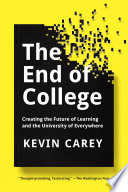

In 'The End of College', author Kevin Carey argues that traditional college education is being challenged by new, alternative education models. These models leverage technology and innovative teaching methodologies to provide more accessible, affordable, and personalized learning experiences. Online courses, boot camps, and competency-based education programs are becoming increasingly popular, allowing learners to acquire skills and knowledge without the need for a four-year degree. This shift is largely driven by the demand for practical skills in the job market, where employers are more interested in what candidates can do rather than where they learned it. As a result, traditional colleges are being forced to adapt or risk becoming obsolete. The book provides numerous examples of successful alternative education programs that have emerged in recent years, highlighting their potential to democratize education and provide opportunities for those who may not fit the traditional college mold.
Continue readingCarey delves into the skyrocketing costs associated with attending traditional colleges and universities. He discusses how tuition fees have outpaced inflation for decades, leading to crippling student debt for millions of graduates. This financial burden raises questions about the return on investment of a college degree, especially when many graduates struggle to find well-paying jobs after completing their education. The author emphasizes that the current system is unsustainable and calls for a reevaluation of how higher education is financed. He suggests that alternative education models not only offer a solution to this crisis but also provide a more equitable approach to learning that doesn't leave students drowning in debt.
Continue readingTechnology plays a pivotal role in reshaping the educational landscape, according to Carey. He explores how advancements in online learning platforms, artificial intelligence, and data analytics are transforming the way education is delivered. These technologies enable personalized learning experiences, allowing students to progress at their own pace and focus on areas where they need improvement. Furthermore, technology facilitates access to a wealth of resources and information, making quality education available to anyone with an internet connection. Carey argues that embracing technology in education can lead to better outcomes for students and more efficient use of resources within educational institutions.
Continue readingIn the book, Carey examines how the nature of work is evolving in the 21st century. With the rise of automation, artificial intelligence, and the gig economy, traditional job roles are being redefined. Employers are increasingly seeking candidates with specific skills rather than formal degrees, which shifts the focus from academic credentials to practical abilities. This trend underscores the importance of lifelong learning and adaptability in the workforce. Carey argues that alternative education models are better suited to prepare individuals for this changing job market, as they emphasize skill acquisition and real-world application over theoretical knowledge.
Continue readingCarey advocates for a shift in mindset towards lifelong learning, emphasizing that education should not be confined to a specific period in one's life. He posits that as technology and job markets continue to evolve, individuals must commit to continuous education and skill development to remain competitive. This perspective aligns with the rise of alternative education models that offer flexible, on-demand learning opportunities. Carey encourages readers to embrace the idea that education is an ongoing process that extends beyond traditional schooling, fostering a culture of curiosity and self-improvement.
Continue readingThe author calls for a comprehensive reform of the higher education system, arguing that the current model is outdated and ineffective. He highlights the need for institutions to adapt to the realities of the modern economy and the changing needs of students. This includes reevaluating curricula, embracing technology, and prioritizing skill development over rote memorization. Carey believes that educational reform is essential to ensure that future generations are equipped to thrive in a rapidly changing world, and he provides actionable recommendations for policymakers, educators, and institutions to consider.
Continue readingIn the concluding sections of the book, Carey speculates on the future of college education. He envisions a landscape where traditional colleges coexist with alternative education models, each serving different purposes and populations. While he acknowledges that traditional institutions will need to adapt to survive, he also sees the potential for a more diverse and inclusive educational ecosystem that prioritizes access and equity. Carey concludes with a hopeful outlook, suggesting that the end of college as we know it could lead to a more innovative and effective approach to education that benefits students and society as a whole.
Continue readingThe reading time for The End of College depends on the reader's pace. However, this concise book summary covers the 7 key ideas from The End of College, allowing you to quickly understand the main concepts, insights, and practical applications in around 22 min.
The End of College is definitely worth reading. The book covers essential topics including The Rise of Alternative Education Models, The Cost of Higher Education, The Role of Technology in Education, providing practical insights and actionable advice. Whether you read the full book or our concise summary, The End of College delivers valuable knowledge that can help you improve your understanding and apply these concepts in your personal or professional life.
The End of College was written by Kevin Carey.
If you enjoyed The End of College by Kevin Carey and want to explore similar topics or deepen your understanding, we highly recommend these related book summaries:
These books cover related themes, complementary concepts, and will help you build upon the knowledge gained from The End of College. Each of these summaries provides concise insights that can further enhance your understanding and practical application of the ideas presented in The End of College.